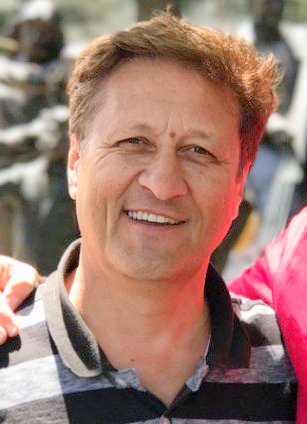Related Research Articles
Rosann Wowchuk is a former Manitoba politician, and was a cabinet minister in the New Democratic Party governments of Premiers Gary Doer and Greg Selinger.
Scott Smith is a politician in Manitoba, Canada. He was a member of the Legislative Assembly of Manitoba as New Democratic Party from 1999 to 2007, and was a cabinet minister in the government of Gary Doer.
Drew Caldwell is a politician in Manitoba, Canada. He was a member of the Legislative Assembly of Manitoba for the constituency of Brandon East from 1999 until 2016, serving as a Cabinet Minister in the governments of Gary Doer and Greg Selinger. Caldwell is a member of the New Democratic Party.

Ronald Reinhold Schuler is a Canadian politician. He is currently a member of the Manitoba Legislature and a representative of the Progressive Conservative Party (PCs). He was first elected in the 1999 provincial election. and was re-elected in the 2003, 2007, 2011, 2016, 2019 and 2023 elections.
Manitoba Finance is the department of finance for the Canadian province of Manitoba.
Gerald Wayne Joseph Mercier is a politician in Manitoba, Canada. He was a member of the Legislative Assembly of Manitoba from 1977 to 1988, and was a cabinet minister in the Progressive Conservative government of Sterling Lyon.

The Province of Manitoba, similar to other Canadian provinces and territories, is governed through a Westminster-based parliamentary system. The Manitoba government's authority to conduct provincial affairs is derived from the Constitution of Canada, which divides legislative powers among the federal parliament and the provincial legislatures. Manitoba operates through three branches of government: the executive, the legislative, and the judicial. The executive branch—the Government of Manitoba—consists of the Executive Council and the Premier, who is the head of government and the President of the Executive Council. The legislative branch—the Manitoba Legislature—is composed of the Lieutenant Governor and the Legislative Assembly, which is composed of the 57 members (MLAs) elected to represent the people of Manitoba, as well as the Speaker, the Clerk, the Officers of the Legislative Assembly, and the employees of the legislative service.
The powers and structure of the provincial Government of Manitoba are set out in the Constitution Act, 1867.
The Minister of Agriculture is a cabinet minister in the province of Manitoba, Canada, responsible for Manitoba Agriculture. The ministry oversees provincial government activity in agriculture, agri-food, and the agri-product sector, as well as natural resource development.
Manitoba Justice, or the Department of Justice, is the provincial government department responsible for administering the Crown Law justice systems in the province of Manitoba.
Manitoba Environment and Climate Change is a department of the Government of Manitoba that is responsible for the management and protection of Manitoba's wildlife, water, species at risk, forestry, and other matters related to environmental stewardship and Manitoba's biodiversity of natural resources.
CentrePort Canada is a tri-modal dry port and Foreign Trade Zone located partly in northwest Winnipeg, Manitoba and partly in the Rural Municipality of Rosser, and situated adjacent to the Winnipeg James Armstrong Richardson International Airport (YWG). With 20,000 acres (81 km2) of industrial land, it is the largest tri-modal inland port and foreign trade zone in North America.
Manitoba Sport, Culture, Heritage and Tourism is the department of the Government of Manitoba responsible for managing government programs and services that support the sport, art, culture, and heritage of the province, through developing, supporting, promoting, and celebrating the identity and well-being of Manitoba and its communities.
Manitoba Advanced Education and Training is the department of the Government of Manitoba responsible for supporting adult learning, post-secondary education, and vocational training in Manitoba.
The department of Indigenous and Municipal Relations was created on May 3, 2016 by the newly-elected government led by Brian Pallister. It combined the responsibilities of the former departments Aboriginal and Northern Affairs and Municipal Government into a single unit.
The Department of Families is the Manitoba Government agency responsible for family-related programs and services in the province of Manitoba.
Manitoba Economic Development, Investment, Trade and Natural Resources is the provincial government department responsible for economic growth and the creation of jobs in Manitoba.
Manitoba Transportation and Infrastructure is the provincial government department responsible for managing infrastructure in Manitoba. It is in charge of "the development of transportation policy and legislation, and [of] the management of the province’s vast infrastructure network."
References
- ↑ "Municipal Relations | Province of Manitoba". Province of Manitoba - Municipal Relations. Retrieved 2021-05-08.
- 1 2 "Annual Report 2019-2020 Municipal Government." Government of Manitoba. Retrieved 2021 May 9.
- ↑ "Manitoba. Department of the Municipal Commissioner."
- 1 2 3 4 Manitoba. Department of Municipal Affairs
- 1 2 3 "Manitoba. Department of Rural Development"
- ↑ "Manitoba. Department of Intergovernmental Affairs (1999-2003)."
- ↑ "Department of Intergovernmental Affairs and Trade."
- ↑ "Department of Intergovernmental Affairs (2006-2009)."
- ↑ "Department of Municipal Government."
- ↑ "A breakdown of provincial cabinet changes". Winnipeg Free Press. Retrieved 17 July 2017.
- ↑ Lambert, Steve. "Manitoba Premier Brian Pallister, leaner cabinet sworn in". The Globe and Mail. The Globe and Mail Inc. Retrieved 18 July 2017.
- 1 2 3 "MLA Biographies - Living". www.gov.mb.ca. Retrieved 2021-05-08.
- 1 2 "MLA Biographies - Deceased". www.gov.mb.ca. Retrieved 2021-05-08.
- ↑ "Annual Report 2015-2016 Municipal Government". Indigenous and Municipal Relations. Government of Manitoba. Retrieved 18 July 2017.